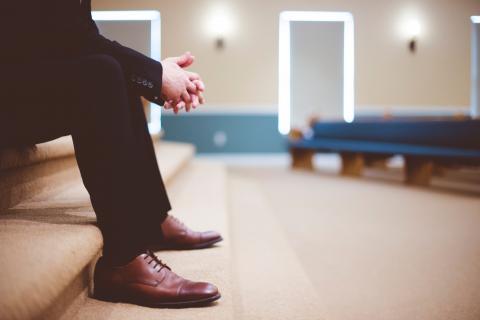
By Brian LeBlanc and Maureen Rulison
We recently had the pleasure and privilege of speaking on the Peace with Dementia Rosary Podcast. I live with Alzheimer’s and vascular dementia. Maureen, my life partner and a professional life-care planner, is the ultimate care partner. We were excited to discuss dementia-friendly worship again from our first-person perspectives on nurturing the spirit while living with dementia.
We freely share a lot of personal information – warts and all – on many different platforms for #WeAreDementiaStrongand A Bit of Brian’s Brilliance to help others prepare for this journey.
As Catholics, we’re called to be in communion with God, in all circumstances, including dementia.
Dementia and Faith: A Call for Inclusivity and Compassion
All faith communities are called to accept and appreciate one another. As Catholics, we’re no different, and can fall short of achieving that ideal – especially when it comes to dementia-friendly worship.
So let’s understand our sisters and brothers in Christ who live with dementia.
Start with Compassion
Starting with compassion and empathy melts away misunderstandings and petty aggravations. For example, if a person living with dementia wanders during Mass or misremembers a response, you won’t mind this disruption. You will be understanding given the difficult path of their spiritual journey.
Priests, lay leaders, and other parishioners need patience and understanding, too. We often say, “If you know one person with dementia, you know one person with dementia.” Symptoms may be similar in individuals, but they can be different and unfamiliar to many depending on the type and stage of dementia. Encountering these differences – especially in a hallowed space – can cause feelings of uncertainty and anxiety in otherwise kind people.
But we all come to the Lord just as He made us.
Worship as We Are
We’ve seen the regression of memories. Dementia lands us in a different place and time. For us these days, it’s like attending Mass in the ’80s or ’90s, which are now becoming my “most recent” clear memories. People living with dementia may better recall older Mass responses or even those said in Latin decades ago.
Science has documented the power of art and music as therapy for dementia care. What is the Church but an artistic homage to God in both beautiful songs and symbolism? People who haven’t communicated verbally for years have sung their favorite hymns perfectly after hearing the first few chords.
Dementia is more than memory loss. Shortened attention spans, cognitive decline and behavioral issues happen, too. Relatively few Catholic churches offer alternative ways to make the Eucharist more accessible. We attend a vigil Mass on Saturdays for that reason.
Change the Narrative
No one questions a person in church who uses a wheelchair. But dementia? The response is often anything but understanding.
“You don’t look like you have Alzheimer’s,” we’ve heard. So, what does Alzheimer’s “look like”? It’s jarring to have your own legitimacy questioned. Worse still, believing dementia has a “look” only perpetuates stigma that persons living with dementia are lesser, incapable, uneducated or uncontrollable, and a burden.
Some even wonder, “What’s the good in coming to church if one can’t comprehend or remember it anyway?” Now that is unwelcoming. A dementia-related illness doesn’t prevent one from being an integral member of the Body of Christ.
That’s why for so long we have called to change the narrative. The words we choose must be more person-focused.
Welcoming Facilities & Resources
Inclusivity for persons living with dementia is more than just open arms and understanding. The Church itself can easily create safe and welcoming environments. Clear signage can prevent disorientation. Spaces can be set aside to accommodate people who may get overwhelmed.
Care partners need help, too. Parish groups and ministries may offer respite care. They may also provide meals and other home services. Dementia-support groups hosted in the parish bring individuals and families together powerfully. The church can launch service projects, community outreach, arts and crafts, exercise, games, and more.
Dementia-Friendly Worship is Key to a Thriving Church
Individuals and families can’t control dementia any more than they can a crying baby. If babies and young children were no longer welcome, the Church would be at a loss. Similarly, if persons living with dementia and their care partners are made to feel unwelcome, the door shuts on good people called to discipleship.
The Lord intended his Church and ministry to be communal. Relationships, understanding and mutual faith – however they may be expressed – help the ecclesial community to thrive.
Christ breaks bread with the saint, sinner and sick alike. We’re called to do the same.
Brian LeBlanc and Maureen Rulison are the co-founders of #WeAreDementiaStrong, a 501(c)(3) nonprofit that provides education, advocacy and resources for persons living with dementia and their care partners.
